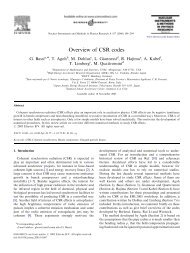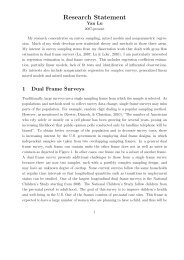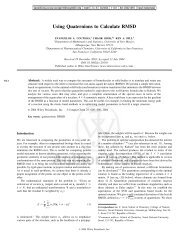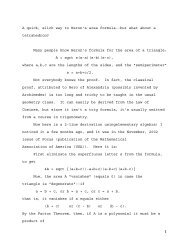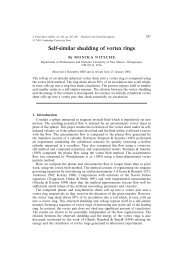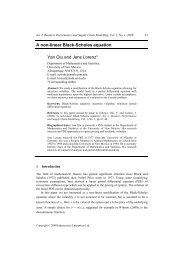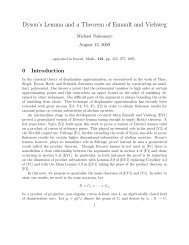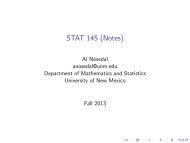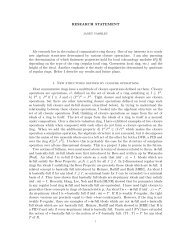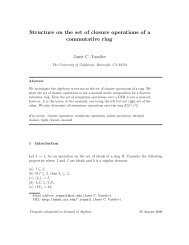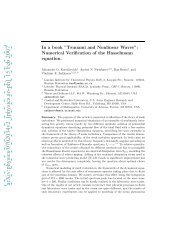OEO Office of Equal Opportunity - Department of Mathematics and ...
OEO Office of Equal Opportunity - Department of Mathematics and ...
OEO Office of Equal Opportunity - Department of Mathematics and ...
You also want an ePaper? Increase the reach of your titles
YUMPU automatically turns print PDFs into web optimized ePapers that Google loves.
HISTORY 215<br />
Community Health Practica<br />
350. Community Health Practicum I. (3)<br />
Experiential learning project conducted in a variety <strong>of</strong> rural or<br />
underserved healthcare settings. Emphasis upon the roles<br />
<strong>of</strong> health pr<strong>of</strong>essionals <strong>and</strong> teams, community health issues,<br />
<strong>and</strong> health care practices, processes <strong>and</strong> systems.<br />
Restriction: Students enrolled in the HMHV program.<br />
450. Community Health Practicum II. (3)<br />
Experiential <strong>and</strong> research project conducted in a variety <strong>of</strong><br />
rural or underserved healthcare settings. Emphasis upon the<br />
roles <strong>of</strong> health pr<strong>of</strong>essionals <strong>and</strong> teams, community health<br />
issues, <strong>and</strong> health care practices, processes <strong>and</strong> systems.<br />
Restriction: Students enrolled in the HMHV program.<br />
HISTORY<br />
Patricia Ann Risso, Chairperson<br />
Mesa Vista Hall Room 1104<br />
MSC06 3760<br />
1 University <strong>of</strong> New Mexico<br />
Albuquerque, New Mexico 87131-0001<br />
(505) 277-2451<br />
Pr<strong>of</strong>essors<br />
Margaret Connell-Szasz, Ph.D., The University <strong>of</strong><br />
New Mexico<br />
Linda Hall, Ph.D., Columbia University<br />
Paul Hutton, Ph.D., Indiana University<br />
Jonathan Porter, Ph.D., University <strong>of</strong> California (Berkeley)<br />
Noel H. Pugach, Ph.D., University <strong>of</strong> Wisconsin<br />
Patricia Ann Risso, Ph.D., McGill University<br />
Richard G. Robbins, Ph.D., Columbia University<br />
Virginia Scharff, Ph.D., University <strong>of</strong> Arizona<br />
M. Jane Slaughter, Ph.D., The University <strong>of</strong> New Mexico<br />
Ferenc M. Szasz, Ph.D., University <strong>of</strong> Rochester<br />
Melvin Yazawa, Ph.D., Johns Hopkins University<br />
Associate Pr<strong>of</strong>essors<br />
Larry Durwood Ball, Ph.D., The University <strong>of</strong> New Mexico<br />
Judy Bieber, Ph.D., Johns Hopkins University<br />
Melissa Bokovoy, Ph.D., Indiana University<br />
Kimberly Gauderman, Ph.D., University <strong>of</strong> California<br />
(Los Angeles)<br />
Timothy C. Graham, Ph.D., Cambridge University<br />
Elizabeth Hutchison, Ph.D., University <strong>of</strong> California<br />
(Berkeley)<br />
Timothy Moy, Ph.D., University <strong>of</strong> California (Berkeley)<br />
Jay Rubenstein, Ph.D., University <strong>of</strong> California (Berkeley)<br />
Jake W. Spidle, Ph.D., Stanford University<br />
Charlie R. Steen, Ph.D., University <strong>of</strong> California<br />
(Los Angeles)<br />
Assistant Pr<strong>of</strong>essors<br />
Jennifer Nez Denetdale, Ph.D., Northern Arizona University<br />
Manuel Garcia y Griego, Ph.D., University <strong>of</strong> California (Los<br />
Angeles)<br />
Nancy McLoughlin, Ph.D., University <strong>of</strong> California (Santa<br />
Barbara)<br />
Barbara Reyes, Ph.D., University <strong>of</strong> California (San Diego)<br />
Enrique A. Sanabria, Ph.D., University <strong>of</strong> California<br />
(San Diego)<br />
Andrew S<strong>and</strong>oval-Strausz, Ph.D., University <strong>of</strong> Chicago<br />
Tom Sizgorich, Ph.D., University <strong>of</strong> California (Santa<br />
Barbara)<br />
Jaon Scott Smith, Ph.D., University <strong>of</strong> California (Berkeley)<br />
Samuel Truett, Ph.D., Yale University<br />
Pr<strong>of</strong>essors Emeriti<br />
Donald C. Cutter, Ph.D., University <strong>of</strong> California (Berkeley)<br />
Robert Himmerich y Valencia, Ph.D., University <strong>of</strong> California<br />
(Los Angeles)<br />
Frank W. Ikle, Ph.D., University <strong>of</strong> California (Berkeley)<br />
John Kessell, Ph.D., The University <strong>of</strong> New Mexico<br />
Charles McClell<strong>and</strong>, Ph.D., Yale University<br />
Janet Roebuck, Ph.D., University <strong>of</strong> London<br />
Enrique Semo, Humbolt University<br />
Donald Skabelund, Ph.D., University <strong>of</strong> Utah<br />
Donald D. Sullivan, Ph.D., University <strong>of</strong> Colorado<br />
Undergraduate Major<br />
A history major is especially well suited to prepare a student<br />
for graduate study or work in the pr<strong>of</strong>essions. The<br />
<strong>Department</strong> encourages those students who have a firm idea<br />
<strong>of</strong> their career goals to specialize at the undergraduate level,<br />
taking courses which will support their career objectives.<br />
Others study history because it gives a general background<br />
which will prepare them intellectually for advanced study<br />
in business, law, theology, archival management, editing,<br />
public administration or similar careers that require a liberal<br />
arts background with a research emphasis. The <strong>Department</strong><br />
encourages such students to take a broad range <strong>of</strong> courses<br />
covering the history <strong>of</strong> the various regions <strong>of</strong> the world.<br />
Undergraduate Major<br />
Requirements<br />
The history program for general majors, as outlined below, is<br />
designed to provide some <strong>of</strong> the cultural background necessary<br />
for intelligent <strong>and</strong> responsible living <strong>and</strong> lifelong intellectual<br />
growth. It also helps to prepare students for a variety<br />
<strong>of</strong> pr<strong>of</strong>essions <strong>and</strong> careers. The lower-division requirement<br />
includes HIST 101L <strong>and</strong> 102L, <strong>and</strong> one <strong>of</strong> the following pairs:<br />
161L–162L, 251–252, 281–282, for a total <strong>of</strong> 12 hours. The<br />
upper-division requirement includes a minimum <strong>of</strong> eight<br />
300-400 level semester courses (24 hours), including HIST<br />
491 (Historiography) or 492 (Senior Seminar). A minimum <strong>of</strong><br />
two courses in each <strong>of</strong> three fields is necessary, i.e., two in<br />
U.S., two in Latin American, two in European, etc. Consult<br />
the undergraduate advisor for variations possible in this<br />
program.<br />
The <strong>Department</strong> will accept the grade <strong>of</strong> C- as counting toward<br />
graduation but requires that the student achieve a minimum<br />
grade point average <strong>of</strong> 2.25 in major or minor studies.<br />
Undergraduate Minor<br />
Requirements<br />
The planned program outlined below is designed to supplement<br />
a student’s work in his or her major field. In total it<br />
requires a minimum <strong>of</strong> seven semester courses (21 hours).<br />
The lower-division requirement includes a minimum <strong>of</strong> two<br />
semester courses (6 hours) from the following: HIST 101L,<br />
102L, 161L, 162L, 251, 252, 281, 282.<br />
The upper-division requirement includes a minimum <strong>of</strong> five<br />
semester courses (15 hours), at least three <strong>of</strong> which must be<br />
concentrated in one field, e.g., U.S., Europe.<br />
The <strong>Department</strong> will accept the grade <strong>of</strong> C- as counting toward<br />
graduation but requires that the student achieve a minimum<br />
grade point average <strong>of</strong> 2.25 in major or minor studies.<br />
Distributed Minor for History Majors<br />
A major may <strong>of</strong>fer a distributed minor in American Studies,<br />
Asian Studies, Comparative Literature or Russian Studies,<br />
as well as a minor in a single department. Approval <strong>of</strong> the<br />
Chairperson <strong>of</strong> the History <strong>Department</strong> is required for all<br />
distributed minors.<br />
<strong>Department</strong>al Honors<br />
The <strong>Department</strong> <strong>of</strong> History has an honors program which<br />
a student may enter with the recommendation <strong>of</strong> his or her<br />
departmental advisor. To complete the program, a student<br />
must take 9 hours in honors courses. A student may <strong>of</strong>fer this<br />
ARTS AND<br />
SCIENCES<br />
UNM CATALOG 2006–2007 Symbols, page 611.



